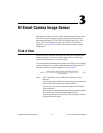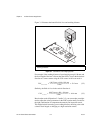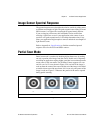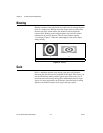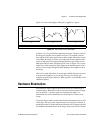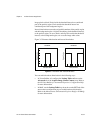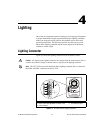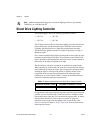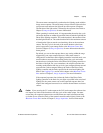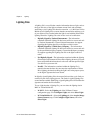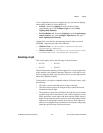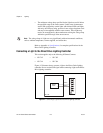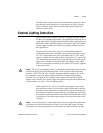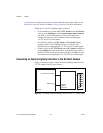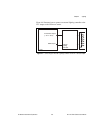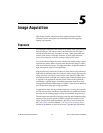
Chapter 4 Lighting
© National Instruments Corporation 4-3 NI 17xx Smart Camera User Manual
The smart camera automatically synchronizes the lighting strobe with the
image sensor exposure. The smart camera always turns the light on before
an exposure starts and turns the light off once the exposure completes.
The duration of the light strobe is dictated by the exposure time. Refer to
Chapter 5, Image Acquisition, for more information.
When operating in strobed mode, it is important that the strobe duty cycle
and strobe duration are within the specified limits of both the light and the
Direct Drive lighting controller. The strobe duration is the amount of time
that the light remains on. The strobe duration limit is the maximum amount
of time that the light can remain on when being driven at the maximum
current. The duty cycle is the ratio of the strobe duration to the frame
period, expressed as a percentage. Refer to the Maximum Frame Rate
section of Chapter 5, Image Acquisition, for more information about the
frame period.
By default, you can set the exposure time to any setting within the range
supported by your smart camera. However, if the smart camera is
configured to use the Direct Drive lighting controller in strobed mode, care
must be taken to ensure that the resulting strobe duty cycle and strobe
duration do not violate the limits of the Direct Drive lighting controller or
the limits of the light. For your convenience, the software calculates the
resulting strobe duration and duty cycle for your configured frame rate and
exposure time. It then compares them to the limits of the Direct Drive
lighting controller and the limits specified in the associated lighting file.
Refer to the Lighting Files section of this chapter or the Maximum Frame
Rate section of Chapter 5, Image Acquisition, for more information.
If the requested exposure time violates the limits of the Direct Drive
lighting controller or the limits for your light as specified in the associated
lighting file, the smart camera can use the requested exposure time, but
requires the configured current to be at or below the maximum continuous
current.
Caution If you are using the 5 V strobe output or the 24 V strobe output, the software does
not impose any limits on the duration or the duty cycle of the strobe output. You must
ensure that your requested exposure time and the frame rate result in duration and duty
cycle that do not violate the limits of the external controller and/or light(s). Refer to the
Maximum Frame Rate section of Chapter 5, Image Acquisition, for more information.



